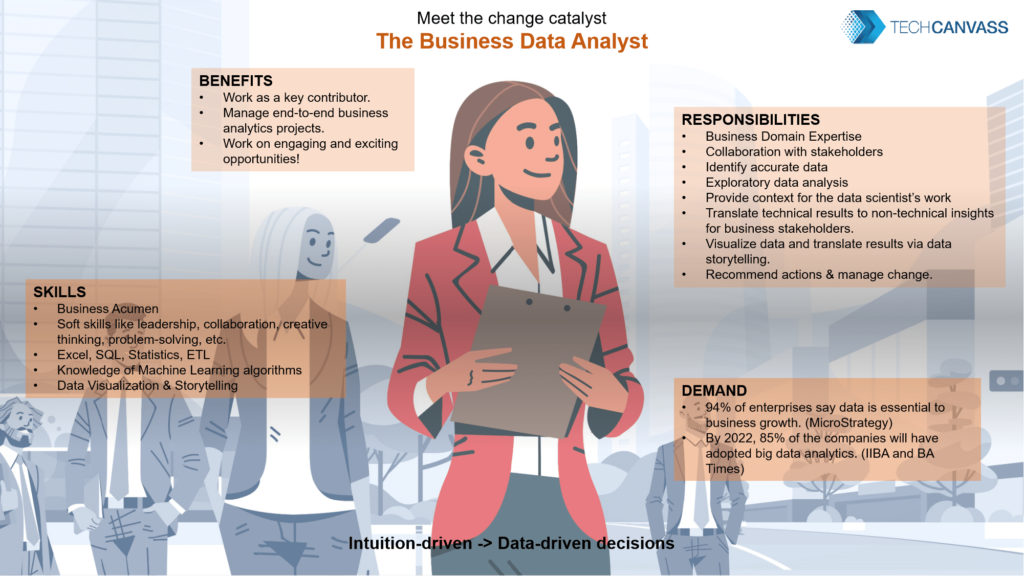With the advent of data in recent years, the role of a traditional business analyst is evolving. Since more and more organizations are becoming data-driven, it has become the need of the hour for business analysts to upskill and learn analytics to stay ahead in the competitive market. Certified Business Analysts are now taking up roles with a mix of business and data analytics like “Business Data Analyst” or “Business Analytics Professional”. In this post, we’ll go over some of the most important data analysis skills for becoming a business data analyst.

Essential Data Analysis Skills for Business Data Analysts
Our business data analytics training program at Techcanvass is designed to equip students with the specialized set of skills they need to not only achieve IIBA’s CBDA certification but also to succeed at work.
Core Business Analytics Skills
A good understanding of business and the domain is a must. What are the other skill requirements? Well, the rapid changes in data and technology may confuse business analysts when transitioning to a business data analyst’s role. Despite these changes, the below-mentioned core analytics skills are the foundation of a robust business data analytics career.
Understanding the Big Picture
Understanding the big picture of the business problem or opportunity is essential when the analyst applies data analysis skills to set the analytics capabilities’ length and breadth, define the vision of the desired analytics outcome, and understand how their recommendations will affect the business.
A Visionary and a Critical Thinker
A business data analyst is a visionary, knowing what business problem in order to tackle or which business opportunity should be taken up to maximize the business outcomes.
A Good Communicator
A business data analyst with strong data analysis skills can present information concisely, ensuring all stakeholders understand the insights and can implement the analytics recommendations effectively. Given their involvement in numerous interactions, a business data analyst must facilitate, negotiate, and listen without biases or assumptions—a crucial skill when engaging with multiple stakeholders.
Analytical Thinker and Problem-Solver
Analytical thinking & problem-solving are pivotal to analyzing business problems and opportunities. Also, to identify which changes may deliver the most value, lead discussions to identify metrics and establish objectives, facilitate conversations during the data collection plan approval, and recommend actions. Now, as the business data analyst handles the entire cycle, there are many opportunities where problems will arise, and you cannot just give up; you must come up with solutions.
Technical Business Analytics Skills
Business data analysts fulfill the demand for domain and technical skills. Pairing business analysis skills with data analytics makes them indispensable for analytics projects. They ensure that the analytics initiatives progress in the direction appropriate for the business problem/opportunity being tackled.
Honing your data analysis skills is vital to leading analytics initiatives and translating raw data into meaningful business insights. Below are some of the top skills:
Microsoft Excel
Excel is also an important tool for analyzing data. The new enhancements by Microsoft like Pivot Tables, Analysis Toolpak, Analyze Data, and Power Query have contributed to the popularity of Excel. It is widely used for its powerful analytical capabilities like comparison, distribution, trend analysis, and correlations.
Statistics
Business data analysts often work with the collected data to summarize and describe it using basic descriptive statistics.
Machine Learning Model Understanding
Don’t let this scare you. A foundational understanding of the machine learning models is enough, you don’t need to know coding or programming. Let me explain why.
Business data analysts use their data analysis skills to determine the most appropriate model for the analytics initiative, collaborating with data scientists and bringing in the business perspective. Therefore, they must explain the chosen model to non-technical stakeholders and gain their approval.
Data Visualization
The business data analyst translates the technical results to non-technical insights for business stakeholders, once the analytical results are ready. They will then be used in decision-making. Business data visualizations coupled with engaging data storytelling are used to communicate insights and drive decision-making. Knowledge of popular tools like Tableau and Power BI plays a key role.
Conclusion
As a business data analyst, you will be the change catalyst, enabling organizations to leverage data analysis skills for informed decision-making. The dynamic, multi-talented role of business data analysts is integral to successful analytics projects. No wonder the demand for skilled professionals is on the rise. Are you equipped for the new Business Analyst’s role?




